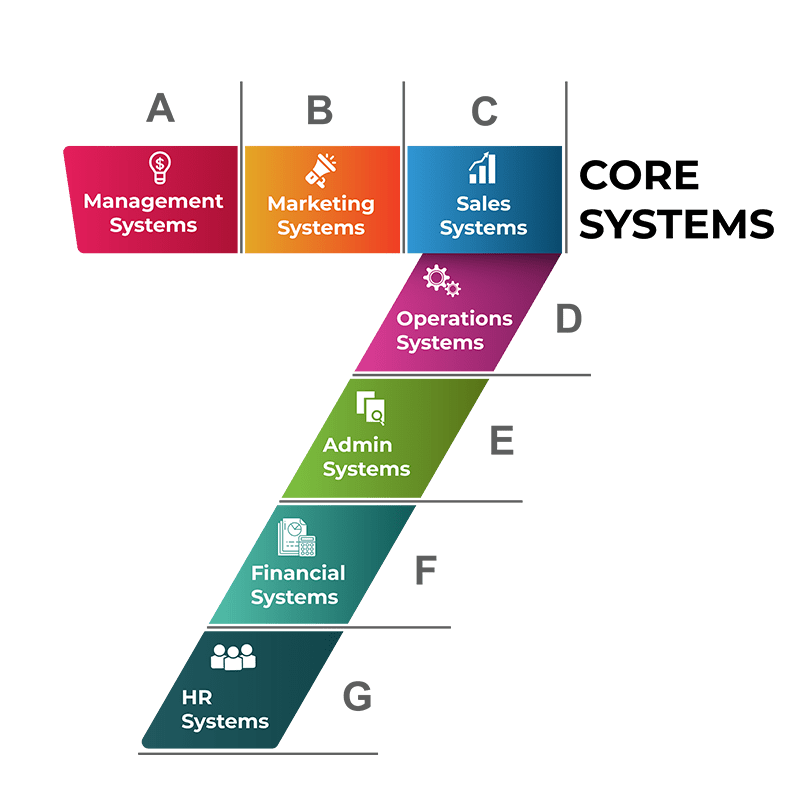Is your business equipped with systems, strategy, skills & all it needs to be Profitable Sustainable Scalable
Take this business assessment to check whether the core business systems and the sub-systems within, which provide a framework for your business to operate are in place and working.
Why do certain businesses continually exceed their sales targets... while others struggle merely to get leads?
Looking For The Answer ?

Well..! The answer is in this assessment that will take you through 7 core business systems for your business and will identify what is wrong and why the momentum is going down.
Simply rate these 35 questions about your company. We then utilise your responses to build a personalised report outlining what you can do right now to promote fresh development in your business.
The assessment takes about 5-10 minutes to complete, following which you’ll get your customised report.
Get Insights on 7 Core Business Systems
Management Systems
Marketing Systems
Sales Systems
Operations Systems
Administration Systems
Financial Systems
People Management System (HR)
Management Systems
The management system is not just about what you do but also about how you do it. It is a tool for measuring your progress, increasing efficiency, and improving quality.
A management system should be designed with your company’s needs and goals in mind. It should be aligned to your company’s strategy, culture, and values so that it can work consistently without any friction from other departments or stakeholders.
Examples:
- Vision, Mission and Core Values
- Business Metric/KPI's
- Systems and Process Management
- Quality Assurance System
Marketing Systems
Marketing Systems is a marketing framework that provides a way to think about marketing and the various actions needed to execute successful marketing programs.
Marketing is not just a set of actions. Marketing is the process of achieving marketing goals by implementing marketing systems.
In this section, we will take a look at the different types of marketing systems and how they can be used to achieve your marketing goals.
Marketing Systems are a set of actions, processes, and tools that are designed to help businesses achieve their marketing goals.
Examples of online and offline marketing processes:
- Content Development
- Website & SEO
- Public Relations
- Social media Advertising
Sales Systems
There are many factors that can affect the effectiveness of your sales system. For example, if you have not properly planned and executed your marketing strategies, then there is a high chance that you will not be able to get enough leads for your business. Similarly, if you are not following up on leads or prospects in a timely manner then they might get lost in the shuffle and there will be no way for them to convert into customers.
In order for your sales system to be effective, it is essential that you take all these factors into consideration before putting together an action plan for yourself.
Examples:
- Customer Relationship Management
- Discovery Consultations
- Loyalty Program
- Sales Re-Conversion
Operations Systems
This is the business function responsible for managing, developing, and regulating the service/product delivery process.
The exact systems in the operations area of business also vary from business to business.
The operations systems department oversees all stages of the process. It designs and controls the process, which starts with the incoming raw materials and ends with the finished product. This means that it has to manage everything from inventory to shipping, manufacturing to quality control, and many other aspects as well.
The operations system department also handles all logistics for a company- from human resources to accounting, ensuring that it has a strong foundation for success in any industry or sector.
Examples:
- Job Costing/Project Scoping
- Product/Service Delivery
- Project Management
- Quality Assurance
Administration Systems
Administration refers to the processes, actions, or behind-the-scenes aspects of running a business. Administration can be subjective and signify various things to different businesses; nonetheless, the fundamental is that it comprises everything in the engine room that keeps the wheel going.
Examples:
- Software, Hardware and IT Management
- Legal Management
- Information/Knowledge Management
- Inventory Management
Financial Systems
A business can not operate without proper financial systems. It is the lifeblood of the business as it manages all money matters.
Financial Systems are important for a company’s growth and development. It ensures that a company has an efficient and effective way to manage its money, assets, and liabilities. Financial Systems also help in managing any financial risks that a company might face.
The finance department is responsible for all money matters in an organization. The department manages all transactions and payments within an organization and between organizations and individuals. It also handles investments, budgets, payrolls, taxes, etc.
The finance department is responsible for understanding financial markets and managing risks associated with it.
Examples:
- Financial Reporting
- Budgeting
- Funding/Investments
- Bookkeeping
Human Resource Systems
Your employees are your most valuable asset. Their performance and contentment have a large impact on your success or failure. Your people management system may help with everything from recruiting to continuing assistance, direction, benefits, and training.
These systems are designed to hire the best people and bring out the best in them.
Examples:
- Hiring Process
- Onboarding/Induction
- Performance Management
- Staff Happiness Management
Easy Steps To Get Your Solutions
01.
02.
03.
Take The Assessment

02.
Rate The Question

03.
Problem Solved

Easy Steps To Get Your Solutions
01.
02.
03.
Take Assessment

Rate Questions

Problem Solved

Still Confused About What to do? Get A Consultation
Book a free 30 minutes discovery call with our industry experts to guide you through the step-by-step process in your entrepreneurial journey.


